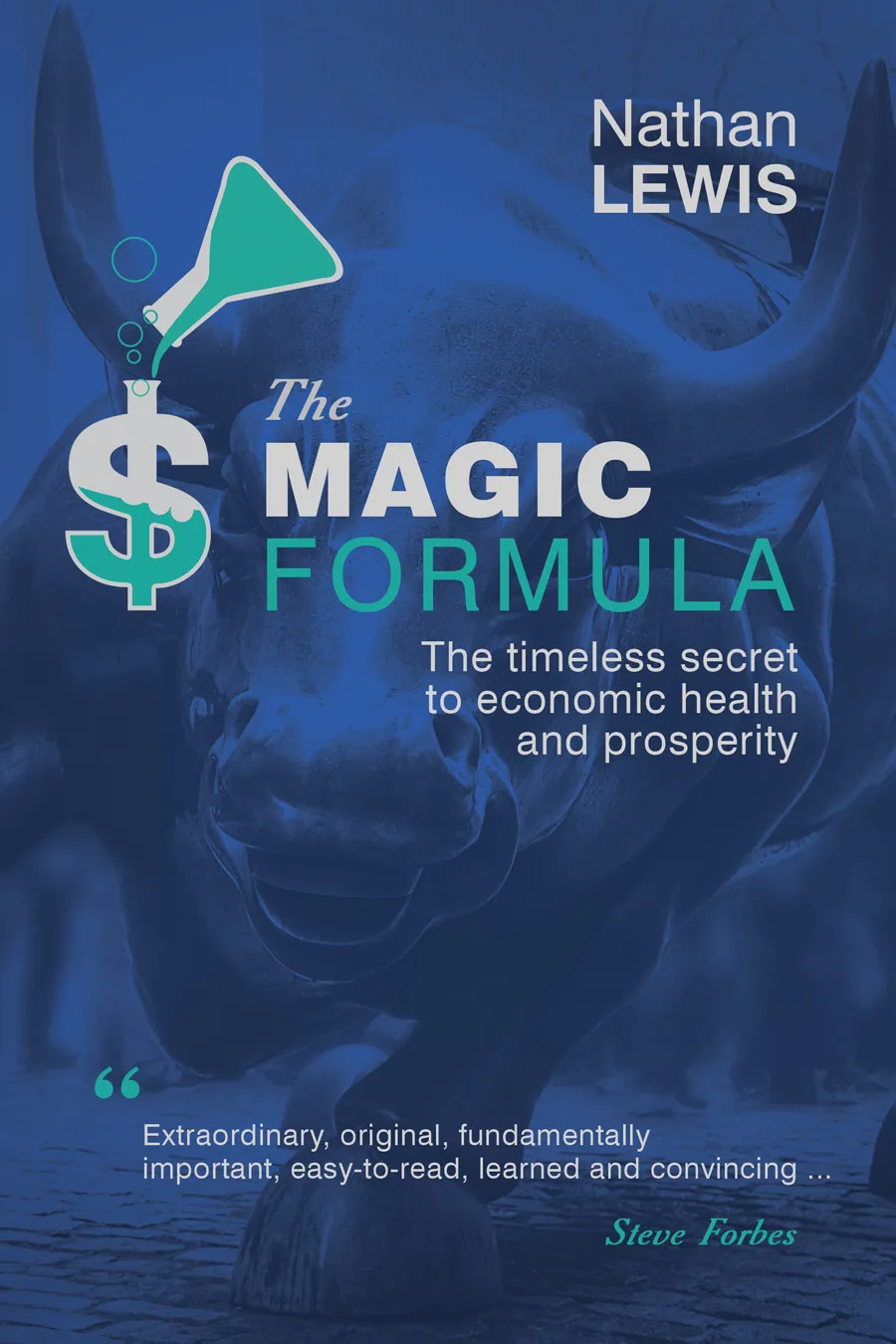The timeless secret
to economic health
and prosperity
Nathan Lewis
Copyright 2019 by Nathan Lewis.
All rights reserved. No part of this book may be reproduced or transmitted in any form or by any means electronic or mechanical, including photocopying, printing, recording or by any information storage or retrieval system, without permission in writing from Canyon Maple Publishing.
Published by Canyon Maple Publishing
PO Box 98
New Berlin, NY 13411
newworldeconomics.com
I can’t make a damn thing out of this tax problem. I listen to one side and they seem right, and—God!—I talk to the other side and they seem just as right, and here I am where I started. I know somewhere there is a book that will give me the truth, but hell! I couldn’t read the book!
President Warren Harding
We’ll never regain price stability until we restore some form of gold backing to the dollar.
President Ronald Reagan
Table of Contents
Introduction by Steve Forbes
Preface
The Magic Formula
Low Taxes
Stable Money
The Spiral of Success
The Spiral of Decline
“Austerity” and “Stimulus”
What We Learned in the Twentieth Century
Suggested Further Reading About the Magic Formula
Notes
References
Index
Introduction by Steve Forbes
Centuries ago Spanish explorers vainly searched for the legendary Fountain of Youth, whose waters would remove all vestiges of aging. That idea was delusional nonsense. But this extraordinary, original, fundamentally important, easy-to-read, learned and convincing book demonstrates that you can accomplish the economic equivalent: an economy that expands impressively over time so that people enjoy always improving levels of prosperity.
Nathan Lewis knows too much about history and human nature to fall for the fallacy beloved by so many economists and policymakers, that an economy can grow smoothly forever without much in the way of ups and downs. But he shows, with the irrefutable proof of history, that states that pursue—and adhere to—low levels of taxation and stable currency values (best achieved with a gold standard) attain astonishing levels of long-term growth. Deviate from the magic formula, and sluggishness and stagnation set in.
Of course, circumstances, particularly wars, can force detours from the formula. But return to it as soon as possible, and the forward march resumes.
Until the First World War, Britain had for centuries been the exemplification of the astonishing potency of the principles of sensible taxation combined with a rock-solid pound. A small island transformed itself from a second-tier power into the largest empire that ever existed. It’s no coincidence that it became the birthplace of the Industrial Revolution. During the 20-plus years it waged war against Napoleonic France, Britain suspended the gold standard and raised taxes. But after hostilities ceased, Britain resumed sterling’s historic tie to the yellow metal and got rid of the personal income tax. Its economy rapidly rebounded. British capital flowing around the world was key to the wealth-creation of the 1800s being almost greater than that of all of the previous centuries combined. Populations expanded and migrated by the tens of millions to pursue new opportunities. Longevity increased, and individual living standards reached levels previously unimaginable.
The U.S. did the same thing following the Civil War, when Congress chucked the income tax and other wartime levies and gradually returned to the prewar gold standard. The period from the 1870s until the outbreak of WWI saw an astounding expansion of the American economy and an impressive increase in real individual incomes.
Lewis’ book makes the magic formula come to life with numerous real-life examples, such as these, right up to our current time. Want to know why Japan is in a rut, why South Korea is seeming to lose its mojo, or understand the pathetic progress of most of the EU? Lewis walks you through all of this.
What makes Nathan Lewis so unique is the original research he does in a field so full of myths and misconceptions, whether it’s the truth about the surprisingly divergent nature in the 16th and 17th centuries of Spain’s domestic economy and that of its overseas empire, the actual way the classical gold standard operated, the causes of the Great Depression, the rarely recognized contradictions in post-World War II economic policy that led to the collapse of the gold-based Bretton Woods monetary system and the subsequent economic chaos of the 1970s and early 1980s, to the troubles we are experiencing today.
Is the magic formula too simplistic? Quite the opposite. Lewis makes the compelling point that following it brings in train other virtues that undergird a flourishing society, such as fiscal discipline, respect for property rights, an increasingly robust civil society and, most crucially, a growing respect for individual liberties.
Given the proof that history continuously provides for the prosperity-creating magic formula of trustworthy money and low taxes, why is it not universally applied? Even more mysteriously, why is it so often abandoned by those who have successfully pursued it? After all, these principles enable the kind of individual creativity that benefits us all and produces the wealth that provides sounder safety nets from the vicissitudes of life.
The answers range from ideas that—falsely—promise quicker and better results to sheer ignorance (even many conservative economists are oblivious to the fundamental importance of sound money) to taking the better times for granted and forgetting the ideas that made them possible. There is a more practical—and potent—reason as well: Academic tenure, government posts, jobs for economists in the private sector, lucrative grants for research and prestigious prizes do not go to those proclaiming a belief in sound money. As Lewis ruefully notes, the Federal Reserve is the Sugar Daddy for thousands of economists, and its attitude towards the magic formula would turn a tropical forest into an iceberg.
It would perhaps be overly dramatic to say one should hold this amazing treatise with trembling hands, as those manuscripts of great and consequential truths are worthy of being held. But it is enough to say it should be read—and acted upon—by all who know we are capable of doing so much better.
Steve Forbes
December 2018
Preface
For a long time, people have asked me for a simple, easy introduction to the economic principles that have been developed since about 1970, known as the “supply side” school of the Classical economic tradition. It has been, I think, the most important development in the study of economics in our time. But people have always known that there was never anything very new about it. The basic ideas are as old as civilization itself. The only surprising thing is that the principles of Low Taxes and Stable Money, which would have been familiar to Confucius, Caesar Augustus or Thomas Jefferson, somehow became neglected in the mid-twentieth century.
The Low Taxes message was picked up by president Ronald Reagan (and also many Democrats of that time), and has, since then, become a maxim of the Republican Party. This has been helped by consistent focus on the topic by “think tanks” such as the Heritage Foundation, American Enterprise Institute and Cato Institute. The 2016 Republican presidential primaries became a “can-you-top-this?” contest in aggressive tax reform proposals. This is a big change from the days (roughly 1960-1977) when the Republican Party served as the dour tax-gatherers for the Democrats, habitually proposing higher taxes to pay for the Democrats’ higher spending. The Low Taxes message always has broad political support, among corporations and also the 20% or so of individuals in the highest income brackets. Besides obvious self-interes...


